Epics.
This is coolbert:
Of all types of literature, the epic poem is said to be the most difficult.
Well, it must be. Only a handful have ever been written in the history of mankind worldwide.
From school days, we are familiar with such epics as "Paradise Lost", by Milton, Ezra Pound's "Cantos", and the "Aeneid", by Virgil. To see a great site that lists the various great epic poems of mankind click here.
Now, many of these epic poems deal with war, warriors, and the feats of warriors. And these are not limited to the western tradition, but are a common genre and theme found worldwide.
Among the epic poems dealing with war from the western perspective, are found the "Iliad", by Homer, "Beowulf", author unknown, "The Song of Roland", author unknown, and surprisingly, "Don Juan", by Lord Byron.
The Iliad of course, deals with the siege and destruction of the city of Troy by the Achaean Greeks. Based upon a real event that occurred in the Bronze Age, the Iliad, along with the Odyssey, both by Homer, are the very cornerstones of western literary tradition. This poem concentrates not so much on the glories of "heroic" warfare, but on the tragedy that befell the protagonists:
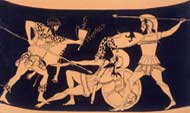
"The poem is a poignant depiction of the tragedy and poignancy of friendship and family destroyed by battle."
Beowulf, the deeds of a Danish thane [knight], is generally accepted to be the earliest work of epic poetry in the English language tradition. The theme, fictional, is one of warriors pitting their skill against an enemy [Grendel, a monster]:

"It is fundamentally a depiction of a pre-Christian warrior society, in which the relationship between the leader, or king, and his thanes is of paramount importance."
The Song of Roland deals with the chivalry of medieval knighthood, during the time of Charlemagne. This was at a time when the societies of western Europe were just beginning to form cohesive groups during the dark ages in the centuries following the collapse of the Roman Empire. What we consider to be western society and culture as we know it today emerged from this period. And the knight on horseback and chivalry as practiced began at this time.
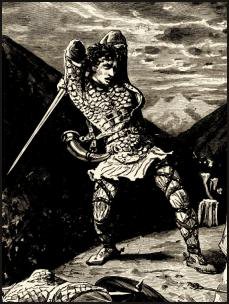
"The Song is based on historical events surrounding the battle of August 15, 778 in which the rear-guard of Charlemagne's retreating Franks was attacked by Basques; in the ensuing massacre, Roland and other important paladins were killed."
"The Saracens attack the rear of the Frankish army. Roland's friend Oliver advises him to blow his horn Olifant to summon the rest of the army. But Roland's code of honour obliges him to fight despite being outnumbered. The Franks are massacred, and at the end, Roland eventually sounds his horn, but it is too late. All his men are killed, but Roland, in his final act routs the last few Moorish forces before finally succumbing to his injuries."
In the epic "Don Juan", Byron places Don Juan in the Russian army under the command of Suvorov at the siege of Ismail, against the Turks.
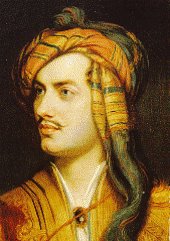
"Suvorov appears in Lord Byron's Don Juan. If you're interested, the entire poem appears at Bob Blair's page (and may be available on line from Project Gutenburg). Don Juan was, of course, the famous lover/swashbuckler, and Byron gives him a role in the siege of the Turkish fortress of Ismail."
To see a short portion of the epic that deals just with Ismail, click here. In Byron's poem, the great Russian general Suvorov is referred to as Suwarrow.
And epic poems dealing with war, warriors and the feats of warriors are not limited to the western tradition.
Perhaps the most famous of all epic poems from the eastern tradition is the Indian [Hindu] epic poem, the Mahabhrata. This epic is based upon an actual historical battle that did occur, probably between kshatriya warriors of the Indo-European tradition around 1400 B.C. The antagonists here are the rival families vying for power, the Pandavas and the Kauravas. This is not only a historical epic, it contains the basic essence of Hindu religion as well. Applicable to this day.
"It is the second longest literary work in the world (after the Tibetan Epic of Gesar) and is hailed as not only one of the greatest epics, but literary accomplishments, of humanity."
"To represent the central war of the Mahabharata as a fight between 'good' and 'evil' is woefully off-base."
"The Mahabharata claims to contain the essence and sum of all the Vedas and other Hindu scriptures. It does include large amounts of interpolated Hindu mythology, cosmological stories of the gods and goddesses, and philosophical parables aimed at students of Hindu philosophy. The Mahabharatha claims that those who do not read it shall find their spiritual and yogic quests remain unfulfilled."

Another outstanding epic poem in the eastern tradition is "Manas". This epic originates in the Kyrgyz people of central Asia. Details the epic combats and lives of the Kyrgyz warriors who founded the traditions of the Kyrgyz people. The message contained in Manas is indeed profound.
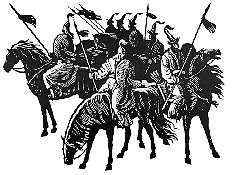
"The epos "Manas" is a genuine epic creation, it reflects not only historic events, but also all sides of human life; social, economic, political situation, struggle for independence, relations with other states. The epos widely depicts the life, goodness and evil, friendship and humanism, love for homeland, care for people's well-being."
A comment must be made about Manas. The length of Manas is immense.
"The known Greek creations "Illiad" (15693 lines) and "Oddyssey" (12110 lines) together have 27083 lines. The above named version of the Kyrgyz epos 20 times exceeds their volume. It is even 2,5 times larger than the ancient Indian "Makhabkharata", which is known as the largest one, and it is 5 times larger than "Shakh-Name" (in the Pharsi language)."
This may be the longest epic poem in the world. [this Tibetan epic of "Gesar", may be longer, but I think the jury is out?]. And this epic is committed to memory by the bards. Persons who can word for word perfect recite the entire poem, and do so as a livelihood, entertaining an illiterate populace in their epic. These bards, and central Asia is perhaps the last stronghold on earth of such persons, chant epics such as Manas and do so with remarkable skill. To give you some idea of how long Manas is, a bard chanting the poem, and doing so for eight hours a day, would take six months to complete the epic if following the same schedule day after day!! To read further about Manas, click here.
And please do not think that these epic poems are not appreciated as being works that have relevancy. Indeed, Manas is chanted to this day by the bards for the Kyrgyz, something that was outlawed under the Soviets. The Soviets felt that Manas would foster nationalism, and guess what, it did!
And yet another epic poem, little known in the west, also has great relevancy. This is "The Battle of Kosovo". How more relevant could this be? About the loss of the Battle of Kosovo by the Serbs to the Turks, the subjugation of the Serbs, and the rebellions and upheaval that followed.
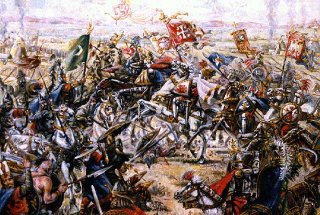
"Everyone in the West who has known these poems has proclaimed them to be literature of the highest order which ought to be known better." (Charles Simic)
"I first fell in love with the ballads that describe the adventures and heroic feats of various rebels during the Turkish occupation. They are "action packed," as they used to say on movie posters. The Turks are the cruel conquerors and the Serbs are either clever slaves or outlaws."
This is the image that the Serbs have of themselves to this day. Brave warriors fighting off the evil invader, reclaiming their stolen land, and the underdog fighting for liberty and justice. All evoked in their epic poem. To read more, click here.
Why do so many epic poems seem to deal with war and warriors and such? Well, Eisenhower stated it well when he said that war brings out the best and worst in the human being. The worst qualities are shown, cruelty, killing, etc. And the best qualities are also shown. Bravery, courage, ability to self-sacrifice one self for a higher cause. War brings out all these qualtities in the human. And the epic poem is a literary vehicle well suited for illustrating this for various societies and cultures throughout the world, and has done so for thousands of years. Art and war are not a contradiction.
coolbert.

0 Comments:
Post a Comment
Subscribe to Post Comments [Atom]
<< Home